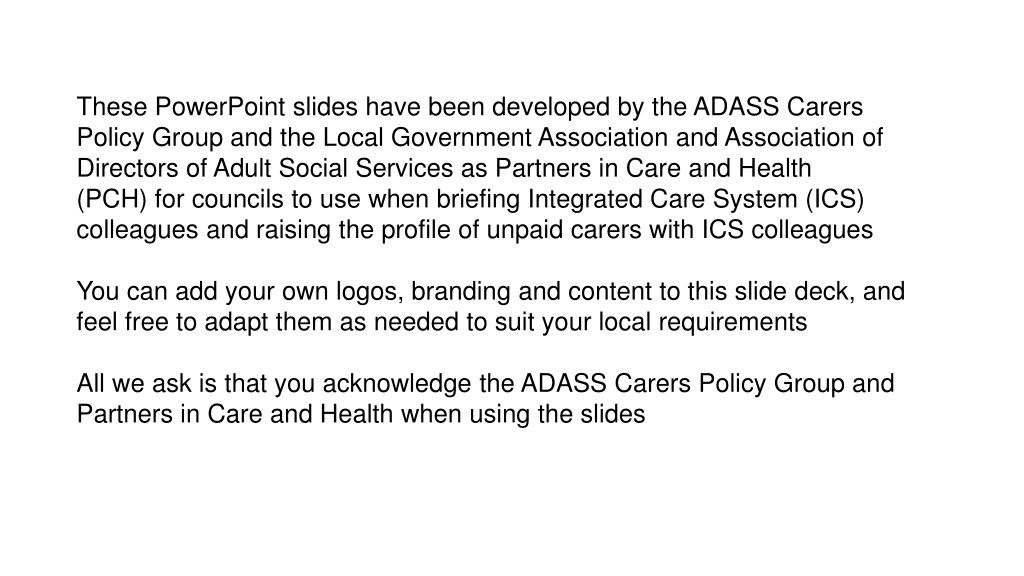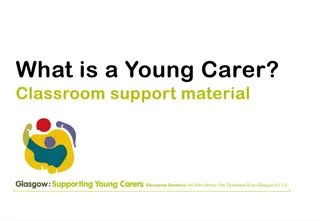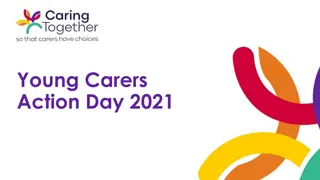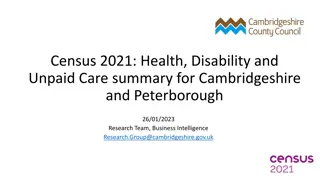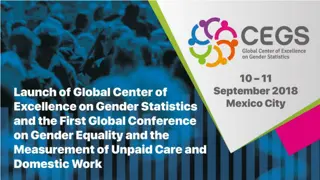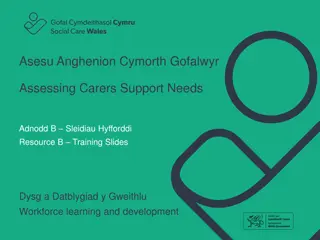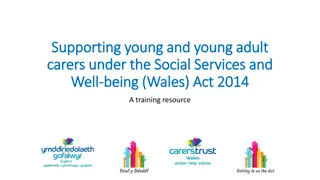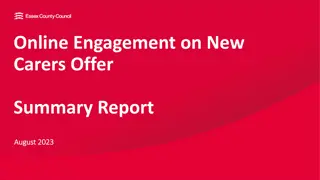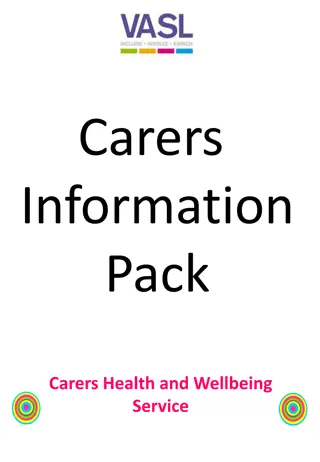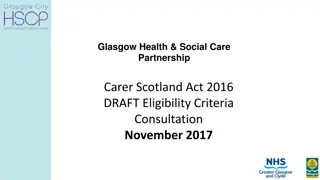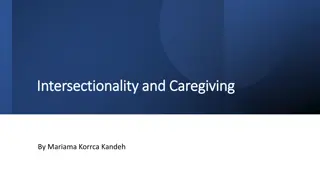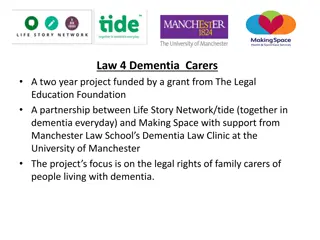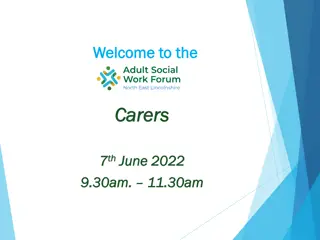Understanding Unpaid Care: Insights from Carers UK State of Caring Report 2022
Carers UK estimates that 10.6 million people in the UK are unpaid carers, providing £193 billion worth of care annually. Women primarily undertake caregiving roles, facing challenges in accessing NHS services and managing work-life balance. The report highlights carers' concerns about the future and the need for systematic identification and support.
Uploaded on Sep 17, 2024 | 0 Views
Download Presentation

Please find below an Image/Link to download the presentation.
The content on the website is provided AS IS for your information and personal use only. It may not be sold, licensed, or shared on other websites without obtaining consent from the author. Download presentation by click this link. If you encounter any issues during the download, it is possible that the publisher has removed the file from their server.
E N D
Presentation Transcript
These PowerPoint slides have been developed by the ADASS Carers Policy Group and the Local Government Association and Association of Directors of Adult Social Services as Partners in Care and Health (PCH) for councils to use when briefing Integrated Care System (ICS) colleagues and raising the profile of unpaid carers with ICS colleagues You can add your own logos, branding and content to this slide deck, and feel free to adapt them as needed to suit your local requirements All we ask is that you acknowledge the ADASS Carers Policy Group and Partners in Care and Health when using the slides
Unpaid care: Carers UK State of Caring report 2022 Carers UK estimate 10.6 million, or one in five, people are an unpaid carer in the UK Carers UK estimate the value of unpaid care provided is 193 billion a year, exceeding that of the NHS Women are most likely to be providing care, and to be providing more hours of care Many carers are facing difficulties in getting NHS treatment, with a third (34 per cent) of respondents waiting for specialist treatment or assessment for over a year Two thirds of those (67 per cent) waiting for treatment said that this is having a negative impact on their physical or mental health Just over 40 per cent of carers said they haven t taken a break from their caring role in the last year
Unpaid care: Carers UK State of Caring report 2022 (continued from previous slide) Half of all carers (51 per cent) said it took over a year to recognise themselves as a carer, with over a third (36 per cent) taking more than three years to recognise this 75 per cent of carers worry about managing to juggle work and care going forward Carers say they are extremely worried about the future: 61 per cent said they were uncertain about what practical support they might be able to access in the next 12 months Carers feedback about NHS services can be found on p. 26-30 of the Carers UK report, with recommendations on p.10. including The NHS needs a strategic and clear delivery approach to identifying carers, across all its structures and delivery mechanisms, so that it is identifying carers systematically and pro-actively systematic identification must include flagging on the patient s and the carer s own patient records.
Unpaid care: the 2021 Census data There has been a 152,000 rise since the last census in the number of carers providing over 50 hours of care with numbers now at just over 1.5 million There s over a quarter of a million rise in the number of unpaid carers providing 20-49 hours of care since the last census Data shows an overall drop in number of unpaid carers from 5.8 to 5 million unpaid carers - ONS say this may be due to changes to the carer s question wording between 2011 and 2021, which has impacted on the number of people who self-reported as unpaid carers There s higher percentage of people providing unpaid care in the most deprived areas in England, compared with the least deprived areas There are 120,000 young carers in England aged between five and seventeen The number of young adults aged 18 to 24 providing between 20 to 49 hours of unpaid care per week has risen from 43,950 in the 2011 census, to 71,120 in 2021.
Unpaid Care: Young Carers - Carers Trust Survey 2023 The 2021 Census reported 120,000 young carers (aged five to 17) in England however Carers Trust and others think there is significant under-reporting with some studies suggesting the figure is as high as 700,000 UK-wide On average, young carers are caring for three years before being identified Multiple research studies have found that young carers have poorer physical mental health, compared to their peers- but more research is needed The COVID Social Mobility and Opportunities Study found young carers are more likely to report psychological distress, self-harm and make attempts on their life According to the Me-We Young Carers project about three in ten adolescent young carers in the UK think about self-harming, and more than ten per cent contemplate harming others carer s experience of hospital discharge - James' Story - YouTube
Unpaid Care: Young Carers - Carers Trust Survey 2023 (continued from previous slide) Carers Trust survey found more than half of young carers and young adult carers (51 per cent) reported that they care for 20-49 hours each week 56 per cent of young carers and young adult carers said the time they spend caring has increased in the last year, and 47 per cent now care for more people than they used to 44 per cent always or usually feel stressed because of being a young carer or young adult carer, and 27 per cent either never or not often feel they get enough sleep One in three young carers and young adult carers (37 per cent) said the NHS did not understand their needs as an unpaid carer either very well or at all . Support for their mental health was one of the top priorities identified by young carers and young adult carers.ng carer s experience of hospital discharge - James' Story - YouTube
Legislative context -The Health and Care Act 2022 For a more detailed briefing see the LGA website The Health and Care Act 2022 outlines several duties on the NHS and Integrated Care Boards (ICBs) relevant to unpaid carers: Extended duty on NHS England and ICBs to consult carers and representatives about the planning and development of commissioning arrangements for their services, or changes to these services which may affect them Extending the requirement to co-operate between NHS bodies, and between NHS bodies and local authorities, about which the Secretary of State may publish guidance A duty of integrated care boards to promote the involvement of carers in decisions relating to prevention, diagnosis, treatment or care in relation to patients A duty to involve carers in decisions and planning when discharging patients from hospital with care and support needs.
The Legislative context The Care Act 2014 Statutory guidance for councils sets out their duties towards unpaid carers including: Parity of esteem with those being cared for, and entitlements to support in their own right A universal information and advice service for all local carers to help them prevent, reduce or delay longer-term needs for care and help them look after their own wellbeing Eligibility for an assessment is based solely on a carer having the appearance of need for care and support and must be offered by councils where this is the case Eligibility for support is based solely on whether the carer s role has a significant impact on their wellbeing and as a result they are unable to achieve one or more of the wellbeing outcomes set out in the Care Act regulations There are no requirements for carers to be providing substantial and regular amounts of care, or for a set number of hours, to be eligible for an assessment. This is important where carers may be providing care that fluctuates over time Carers have entitlements to advocacy, information, advice, personal budgets, and direct payments Councils must conduct a transition assessment when a carer is likely to have needs for care and support under the Care Act when they, or the person they care for, transitions to the adult system. This includes young carers, and a child s carer (or parent-carer).
The I statements from People at the Heart of Care The People at the Heart of Care White Paper reinforces the intentions of the Care Act, saying the government s vision recognises unpaid carers for their contribution and treats them fairly and sets out a series of carer s I statements by which to judge how well we are doing in supporting unpaid carers: We want carers to be able to say I know where to find user-friendly information and advice that is inclusive of my communication and accessibility needs to make informed and empowered decisions about my life now and in the future. I know what my rights are and can get information and advice on all the options for my health, care and housing. I understand the support that is available to me in my area to maintain my own health and wellbeing and achieve the outcomes that matter to me. I am provided with tailored information and advice to support the person I care for
Legislative context coming up TheCarer's Leave Bill received royal assent on 24 May 2023, introducing a statutory entitlement to five days unpaid carers leave per calendar year, for employees that are providing or arranging care According to theEquality Act 2010, discrimination by association would mean that someone was treated less favourably than someone else because they were caring for an elderly or disabled person. Carers UK are working towards having carers included as a protected characteristic.
Guidance and toolkits NICE Guideline: Supporting Adult Carers plus a baseline self assessment NICE: Supporting Adult Carers Quality Standard NHS England: An integrated approach to identifying and assessing Carer Health and Wellbeing which includes a template Memorandum of Understanding (MOU) that local systems can use to help them work together to support carers of all ages No Wrong Doors: working together to support young carers and their families is a template MOU to improve joint working in relation to young carers and parent-carers (due for a refresh 2023/24) Carers Trust s Triangle of Care,Carers Included is a framework based on the principle that carers, people who use services and professionals should work in equal partnership Carers and Hospital Discharge Toolkit for London Hospitals and Community Providers from the Carers Trust The Care Act & Whole Family Approaches (includes supporting parent-carers)
What does the NHS Long Term Plan say about carers? The Long Term Plan makes several commitments to support for unpaid carers including: Carers will benefit from greater recognition and support We will continue to identify and support carers, particularly those from vulnerable communities Carers should not have to deal with emergencies on their own Young carers should not feel they are struggling to cope on their own. The NHS will roll out top tips for general practice which have been developed by young carers, which include access to preventative health and social prescribing, and timely referral to local support services. There will be straightforward digital access to NHS services, and help for patients and their carers to manage their health Patients, clinicians and the carers working with them, will have technology designed to help them manage their interactions with the NHS, and a view of their records, care plans, expectations, appointments and medications, to enable care to be designed and delivered in the place that is most appropriate for them The Quality Markers Framework for Primary Care: supporting Carers in General Practice will be embedded
What role do Integrated Care Boards have in better supporting unpaid carers in their area? The Nuffield Trust s Report Falling short: How far have we come in improving support for unpaid carers in England? (Oct 2022) makes a number of recommendations for action by ICBs: As part of place-based commissioning, ICBs should recognise carers as a group for whom there is clear evidence of poorer health outcomes. ICBs should include carers in population-based commissioning of services to address health inequalities including them in health inequalities impact assessments, and collecting data on carers health outcomes and care experiences ICBs should identify practical actions to make a positive difference for carers at local level through eg a succinct list of actions including quick wins to support carers, with explicit indicators of success, and clarity on responsibility for delivering these; this should be co- developed with carers to ensure priorities align with local need
What role do Integrated Care Boards have in better supporting unpaid carers in their area? (continued from previous slide) Integrated care systems should focus on making best possible use of local data to identify local need, and commission services to meet that need. This means creating partnerships with data and digital infrastructure leads at both national and local level. ICBs must work with councils to ensure access to support on an equal footing for all carers avoiding a postcode lottery and actively tackling the potential impacts of intersectionality (how different patient characteristic may combine or interact with each other) and geographical inequalities in support. This is particularly important given the 2021 census data shows clustering of very high intensity caring (50 plus hours a week) in areas with the highest levels of disability and deprivation.
Recommendations for integrated care systems-next steps The ADASS Carers Policy Network recommends that integrated care systems focus on the following: Developing a system in which unpaid carers are treated as expert partners in commissioning, shaping and co-producing integrated care at strategic level Using the NICE quality standards for what good support looks like for carers, identifying four or five strategic topics for focused work as a system Ensuring carers are enabled to contribute to quality monitoring and scrutiny work of the work of ICBs Ensure a whole family approach is taken across children s, adult s and other relevant services, making use of No Wrong Doors: working together to support young carers and their families to improve joint working in relation to young carers and parent-carers Recruiting Independent Carer Leads at ICB level Taking an integrated approach to the early identification and recognition of unpaid carers
[Placeholder slide to drop in examples of local good practice examples of systems valuing unpaid carers and any recommendations you d like to make]
Research, reports and resources [this can be added to] Caring as a Social Determinant of Health Evidence Review (Public Health England 2021) Supporting Carers: Sharing Best Practice in Integrated Approaches to Support (National Development Team for Inclusion 2019) Top wellbeing tips for young carers (NHS England 2021) Equality Delivery System 2022 (NHS England 2022) - carers are a health inclusion group New Economics Foundation (NEF) : Unpaid Care Isn t Free (2019) A 2019 model built for the NHS by NEF Consulting places the total cost that unpaid caring incurs on carers and society in England at between 24 billion and 37 billion each year, and growing Falling short: How far have we come in improving support for unpaid carers in England? (Nuffield Trust 2022)
Research, reports and resources [this can be added to] National Institute for Health and Care Research project (in progress) evaluating support for unpaid carers funded through the Better Care Fund Letter from NHS to GPs about recording carer status on records and coding carers in GP records (NHS England 2022) Next steps to put People at the Heart of Care-section on joining up services to support people and carers (p.35-6) (Dept Health and Social Care 2023) One in three NHS England employees juggle job with caring unpaid for a loved one Caring in a complex world: perspectives from unpaid carers and the organisations that support them (The Kings Fund 2023) Social care 360: workforce and carers (The Kings Fund 2023)
Research, reports and resources [this can be added to] Care Quality Commission (CQC) Interim guidance on our approach to assessing integrated care systems (2023) CQC s assessment of integrated care systems: what you need to know (CQC 2023) Unpaid carers and Care Quality Commission assurance (Partners in Care and Health 2023) Ten Things to Do Now to Prepare for CQC Assessment (Partners in Care and Health 2023)
